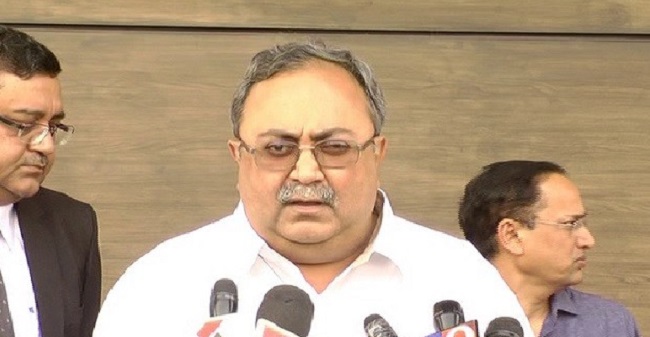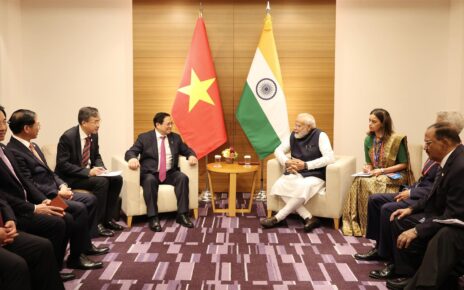‘New Cottage and Rural Industries Policy 2016’, prepared under the guidance of Smt. Anandiben Patel, Hon’ble Chief Minister of Gujarat, aims to promote the growth and development of cottage and rural industries in Gujarat, with special emphasis on the socio-economic development of the people engaged in the sector through the generation of supplementary employment opportunities, improvement in their quality of life and the preservation of traditional crafts. The policy was announced by Shri. Saurabhbhai Patel, Hon’ble Minister of Cottage Industries.
Several new initiatives have been proposed under this policy.
A pilot project on the concept of “One Village One Product” would be initiated to preserve and revive the heritage of languishing crafts
Languishing crafts would be identified and promoted through production as a niche high quality product
linked to the village where it has been practiced traditionally. Additionally, focused support in the form
of diagnostic research, facilitating availability of raw material, training in design development and product diversification as well as encouragement for branding and marketing of the products would be
provided. Artisans practicing languishing crafts would be extended special rebate on sales of products as
well as facilitated to participate in National and International fairs / exhibitions.
A Design Studio for the Handicrafts sector covering cane and bamboo crafts, pottery and clay idol making, leather, jute and natural fiber articles would be set up in GMK&RTI. A Design Studio for Khadi
and Handloom would also be established. Assistance would be provided to artisans for new techniques
and technologies for enhanced production. Design workshops would be conducted for artisans using the
services of expert designers from institutions like CEPT, NIFT, NID as well as practitioners from the industry. Designers would be encouraged to provide innovative designs online by providing remuneration for designs selected. A set of projects would be identified and offered as internship
opportunities to students of reputed institutions to facilitate and provide artisans with professional
inputs and expertise through an industry-academia interface
To encourage and recognize the contribution of outstanding artisans, a scheme of state level awards has
been enhanced under this policy. The award winners would be given a maximum cash prize of Rs. 1,00,000/- along with a State Merit Certificate, plaque and shawl. These awards would be given in four
categories: Textiles, Embroidery, Bead-work / Leatherwork / Earthen / Wood & Bamboo work / Metal
Crafts and Other crafts (Paper craft, paper mache, shell crafts, agate crafts, and coir products)
In order to attract and motivate the younger generation of artisans to continue practicing their traditional craft, a special award of Rs. 1,00,000/- would be instituted for them in the ‘Young Artisans’
category (up to the age of 35 years). An award of Rs. 1,25,000/- for best Woman Artisan would be provided. A special award of Rs. 1,25,000/- would be provided to artisans practicing languishing crafts. Craft circuits would be developed and promoted by linking craft clusters with popular tourist destinations of the State, in collaboration with the State Tourism Department. Groups of artisans would
be sponsored for participation in select international exhibitions / fairs. Artisans practicing languishing
crafts would also be provided special rebate on sales of handicrafts. Market Development Assistance of
15% will be provided as incentive to khadi artisans & institutions on production and sale of Khadi and Poly-vastra products throughout the year. Artisans / industrial cooperatives would be facilitated in getting Geographical Indication (GI) certification. The network of Garvi-Gurjari retail outlets across the
country would be strengthened and expanded. Artisans would be provided space for sale of their
products at shopping malls / complexes in big cities by iNDEXT-c, which would hire the place on rent.
Direct linkage would be provided between the artisans and the buyers through e-commerce marketing
platforms (www.estoregurjari.com and www.craftofgujarat.gujarat.gov.in). The purchase limit for the
procurement of Khadi and Village Industries products without tendering process under the Purchase
Policy of the State Government would be revised to support the sector. Dissemination of information
and guidance about schemes would be provided through a toll-free helpline.
Under this policy provisions are made for infrastructure development in the sector. A state museum
would be set up. To give a fillip to Public-Private partnership projects, the Craft Business Development
Center (CBDC) scheme would be revised and revamped – viable projects with unit cost ranging from
Rs. 3 crores to Rs. 7 crores would be eligible. To meet the needs of Industrial Cooperative Societies for
infrastructure development, the requirement to own land for availing assistance under the Gramodyog
Vikas Kendra (GVK) Scheme and Cluster Development Scheme (CDS) would be relaxed. Financial
assistance would be extended for purchase of buildings for use as Craft Facilitation Centres (CFC).
Assistance would be provided to societies / industrial cooperatives to lease buildings for a minimum of
10 years and assistance would be provided to the extent of 50% of lease rentals subject to an annual
ceiling of Rs. 2 lakhs, after starting of the commercial production over a period of 5 years.
A start-up fund would be set up through Gujarat Venture Finance Ltd. (GVFL). The overall business and
commercial incubation of the ideas would be handled by select partnering/mentoring institutions such
as IIM-A, NID, NIFT, CEPT etc. And Incubation Centre would be set-up in GMK&RTI with a special focus
on rural technology – financial assistance would be provided to partnering / mentoring institutes as well
as the incubatees. Keen interest has been evinced by many states in utilizing and benefiting from the
technology and tools developed by GMK&RTI. A framework for transfer of technology and collaboration
between GMK&RTI and respective State institutions would be developed. The R&D workshop and
facilities at the GMK&RTI would be strengthened and modernized.
There is a special focus on equipment, tools and production support in this policy. The cost of toolkits provided under Manav Kalyan Yojana would be periodically reviewed and would be suitably revised. 75% financial assistance for purchase of handlooms, Electric Potter Wheels and Pug Mills would be provided to increase the productivity of artisans. Similar financial assistance would be provided for the
newly developed Electric Blunzer / Agitator, Ball Mill cum Pot Mill and Clay Granular. 90% financial assistance would be provided for purchase of Amber Charkha. A state wide online supplier directory and
raw material bank for select crafts would be developed to facilitate raw material procurement. Artisans
would be facilitated for availing loan under DTAISY for procurement of raw material through this bank.
Artisans would be brought under the cover of various social welfare schemes provided by the Central
and State Government to ensure their social security.
The handloom and handicrafts sector is a major source of supplementary income generating activities for a large number of women in Gujarat. The awards given to the best woman artisans would carry a higher financial reward of Rs.1,25,000/-. Under Shri. Vajpayee Bankable Yojana, special 15% assistance at rural level and special 10% assistance at urban level as well as under Dattopant Thengadi Artisans Interest Subsidy Scheme special 5% margin money subsidy would be provided. Women industrial cooperatives would be provided special assistance of 25% for equipment and special rebate of 10% on sales of handicrafts and handlooms.
Pilot projects would be undertaken to provide assistance to eco-friendly practices in the focus areas of
hand-made paper, coconut and banana fibre based products, clay (mati) and earthen products.
The ‘New Cottage and Rural Industries Policy’ focuses on several underlying objectives as well as
introduces several new initiatives, namely:
To improve the overall quality of life of artisans
To revive and preserve the languishing crafts of Gujarat by providing support and strengthening the
To set up a Crafts Museum showcasing the exquisite arts and crafts of Gujarat
To provide focused skill development to artisans through targeted training in design, production
processes, marketing and business skills to enhance the marketability of their products
To strengthen and facilitate development of infrastructure to enhance production and to provide better
To provide improved tools and technology to the artisans to facilitate production of better products
To strengthen the ‘Garvi Gurjari’ brand to reflect quality craftsmanship
To expand the marketing avenues for artisans and craftspersons by promoting craft clusters through
To encourage and promote an entrepreneurial eco-system by incubating innovative ideas
To encourage Public Private Partnership (PPP)
To improve the socio-economic condition of women engaged in this sector by providing them special
To facilitate enhanced livelihood opportunities to encourage the younger generation of artisans to continue practicing their traditional crafts
To ensure access to credit, comprehensive social security and welfare measures for the people engaged
To strengthen and provide financial assistance and credit support to industrial cooperatives working in
To promote and propagate the use of eco-friendly raw materials and production processes.





